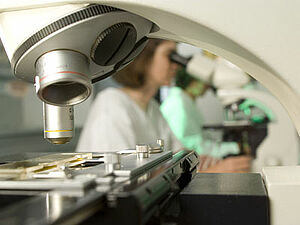
The laboratory's main tasks are to carry out parasitological diagnostics as well as laboratory trials for FiBL research projects. The diagnostic spectrum comprises more than twenty established methods for the detection, quantification and characterization of eggs, larvae and adult gastro-intestinal worms, lung worms, liver fluke and coccidia. Our methodological focus in this respect is on the microscopic examination of faecal samples from all livestock species.
Our laboratory is also in charge of diagnostics for the parasite monitoring programme run by the Swiss small ruminant advisory and health service (Schweizerischer Beratungs- und Gesundheitsdienst für Kleinwiederkäuer, BGK). We annually examine approximately 7000 faecal samples of sheep, goats, deer and South American camelids for this monitoring programme. We further assess the parasite infestation of cattle, chickens and horses on behalf of livestock owners and veterinarians.
In addition, we have developed assessment methods for the investigation of various alternative strategies for controlling internal and external parasites. These methods are used to assess, for example, the effect of plant-based compounds on the development of gastro-intestinal worms or on poultry mites. We also carry out laboratory work on behalf of other research projects in our department, such as wet fractionation of cattle faeces, processing of milk samples or roughage analysis.
Further information
Contact
Link
fibl.org: Overview of the analyses and services offered including corresponding order forms



